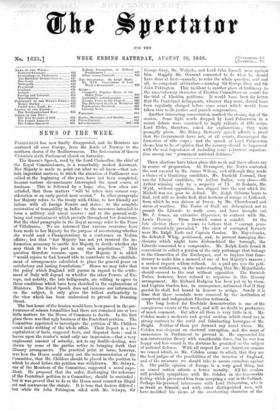NEWS OF THE WEEK.
PArmA WENT has now finally disappeared, and its Members are scattered all over Europe, from the fiords of Norway to the northern shores of the Mediterranean. The first session of Queen Victoria's sixth Parliament closed on Saturday.
The Queen's Speech, read by the Lord Chancellor, the chief of , the .Royal Commissioners, is a remarkably modest document. Her Majesty is made to point out what we all know—that cer- tain important matters, to which the attention of Parliament was _called at the beginning of the year, have not been completed, because various circumstances interrupted the usual course 'of business. This is followed by a hope, alas, how often nil'.. satisfied, that these matters "will be taken into earnest con- sideration at an early period next session." In other paragraphs her Majesty refers to the treaty with China, to her friendly red, lations with all foreign Powers and states ; to the complete restoration of tranquillity in India ; to the measures intended to form a military and naval reserve ; and to the general well- being and contentment which prevails throughout her dominions. But the chief paragraphs in the Royal message refer to the Peace of Villafranea. We are informed that various overtures have' been made to her Majesty for the purpose of ascertaining whether she would send a Plenipotentiary to a conference on Italian affairs ; but that "her Majesty has not yet received the in- formation necessary to enable her Majesty to decide whether she may think fit to take part in any such negotiations." This question therefore remains open. Her Majesty it is added "would rejoice to fmd herself able to contribute to the establish- ment of arrangements calculated to place the general peace on satisfactory and lasting foundations." Hence we may infer that _the policy which England will pursue in regard to the settle- ment of Italy will depend on whether the other Powers of Eu- rope, and notably, the late belligerents, are willing to agree to -those conditions which have been sketched in the explanations of Ministers. The Royal Speech does not increase our information on the subject, it only gives the fullest authenticity to the view which has been understood to prevail in Downing Street.
. The last hours of the Session would have been passed in the per- formance of solemn formalities had there not remained one or two little matters for the House of Commons to decide. In the first place there was that ugly business of the Pontefract petition. The Committee appointed to investigate the petition of Mr. Childers could make nothing of the whole affair. Their Report is a re- capitulation of facts, supposed facts, and disputed facts ; and it leaves upon the reader's mind only one impression—that a very • unpleasant amount of astucity, not to say double-dealing, was - shown by some of the parties active in bringing forth that illusory arrangement. The practical point at issue, however, was how the House could carry out the recommendation of the Committee, that Mr. Childers should be placed in the position in which he stood before. the petition was withdrawn. Mr. Selwyn, one of the Members of the Committee, suggested a novel expe- dient. He proposed that the order, discharging the reference
of the Pontefract petition to a Committee, should be rescinded ; . but it was proved that to do so the House must commit an illegal . act and contravene the statute. It is true that doctors differed ; but while Sir John Pakington sided with Mr. Selwyn, Sir
George Grey, Mr. Walpole, and Lord John Russell were against him. Happily Mr. Overend consented to do what he should have done at first—namely, to refer the whole question, seat and all, to competent arbitrators—naming Sir George Grey and Sir John Pakington. This incident is another piece of testimony to the unsatisfactory character of Election Committees as courts for the trial of Election petitions. It would have been far better that the Pontefract delinquents, whoever they were, should have been regularly charged before some court which would have taken care to do justice and punish compromises.
Another interesting conversation marked the closing day of the session. Some light words dropped by Lord Palmerston in a recent debate were construed to imply ridicule of rifle corps. Lord Elcho, therefore, asked for explanations ; they were promptly given. Mr. Sidney Herbert's speech affords a proof that the Government have not, at all events, discouraged the formation of rifle corps ; and the speech of Lord Palmerston shows him to be of opinion that the country should be impressed with the real importance of including some volunteer organiza- tion among our "permanent national defences."


























